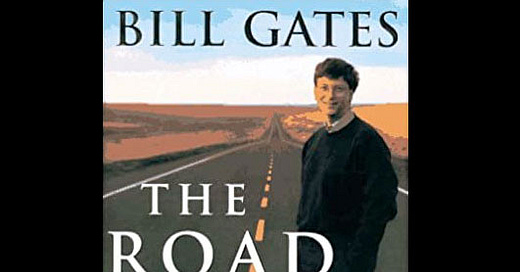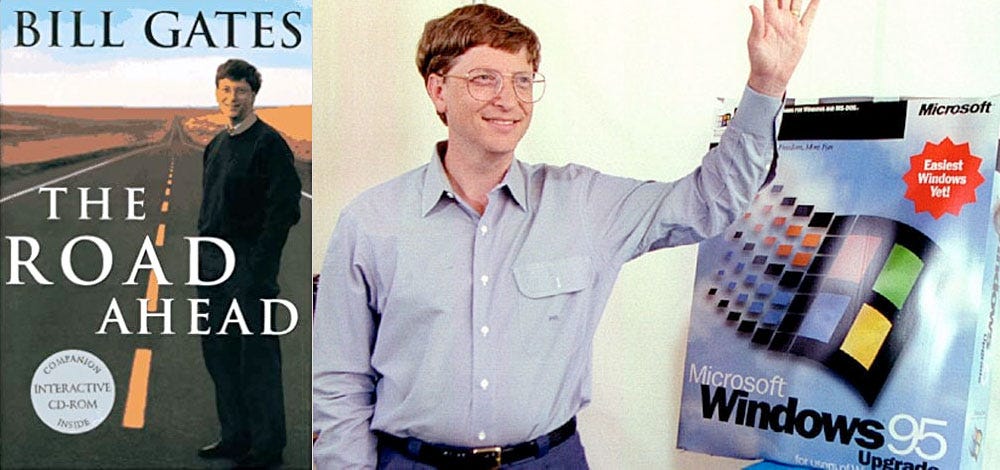25 Years Ago: The Road Ahead
Today in 1995, Bill Gates published his book predicting the future of everything
Nobody knows anything, and those who claim dominion over the future know even less.
That’s the retrospective lesson of The Road Ahead, a book published by Bill Gates 25 years ago today, which attempted to predict the future of technology, entertainment, capitalism, media, education, and so much more. I try to read this book every few years, just to remind myself how laughably feeble humans are at predicting shit.
In 1995, Bill Gates was peak Bill Gates. Windows 95 was being booted onto millions of computers, the antitrust trial against Microsoft was still a few years away, and the future looked like a heavy plastic box plopped on every desk. But the internet was just around the corner, and Gates was notoriously slow at realizing its impact. In the 286 pages of The Road Ahead, he mentions the internet only a few times, and usually in a manner that makes it sound like a photocopier playing footsie with a rolodex.
To his credit, Gates gets it halfway right, sometimes. He was remarkably close to predicting mobile devices, for instance, imagining a future where “wallet PCs” populate our pockets. Give him soothsayer points for this sentence: “A really sophisticated wallet PC might cost what an elaborate camera does now, $1,000 or more.” Nice one, Bill. Sorry, though, we have to deduct points for this one: “Mobile devices will be able to send and receive messages, but it will be expensive and unusual to use them to receive an individual video stream.”
For being a tome of futurism, The Road Ahead is strangely preoccupied with old tech, especially telephones and television. If it resembles any genre, it’s 1950s science fiction. At one point, Gates predicts phones will get screens and cameras (yeah), but then claims “they’ll look more or less like today’s phones” (oops). Thankfully the book comes with a CD-ROM, packed with videos of Bill explicating this wonderful gadget future. If only we modern folk had machines to play it.
The most telling chapter comes near the end, when Gates unveils his enormous “home of the future,” built the banks of Lake Washington across from Seattle. [Sidenote: I once drank two glasses of pinot grigio there, for a reception in 2006. Magnificent wood. Great bones!] Gates spends paragraph after paragraph gloating about the miles of ethernet cable winding through the walls of his “smart home.” At this exact moment, the book turns to tragedy, because the reader knows a crucial detail the author does not: In just a few years, Wi-Fi will be widespread and all those miles of copper will become completely worthless.
And yet, after all these follies of futurism, I still enjoy cracking open this book every few years, mostly to gauge its relevance today. I have come to believe that Bill knew his vision was cock-eyed all along. He agreed to write what was essentially a pulpy science fiction novel, and he somehow sold over 2.5 million copies. He must have known it was populist schlock, because before it even hit book stores, he famously wrote a grave internal memo titled The Internet Tidal Wave, declaring the internet an existential threat to Microsoft. Six months later, the book barely even mentioned the internet. Something is amiss!
Meanwhile, here’s how the rest of the world discussed the internet in 1995:
Nobody knows anything.
MORE ANNIVERSARIES
60 Years Ago Today: The mathematically-minded literary group Oulipo was founded in Paris.
60 Years Ago Today: Wilt Chamberlain pulled down a record-setting 55 rebounds in a single NBA game.
70 Years Ago Today: Guys and Dolls debuted on Broadway at the 46th Street Theatre.




